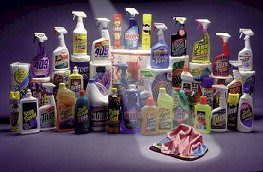"Microfiber Cleaning Products - How They Work","In the last decade the popularity of microfiber cleaning products such as towels, mops, and dusters has grown exponentially. The reason for this popularity is simple, they're very effective tools. These products clean with less effort than traditional methods and without the need of additional chemicals. The tools with which to use them are also more ergonomic than traditional cleaning equipment.
First, let's look at what microfiber is. Microfiber is defined as any fiber that is 1 denier or less (denier is a measurment of fineness equal to a unit of fiber weighing one gram for each 9000 meters). To put that into perspective, each fiber is 1/100th the diameter of a human hair and 1/20th the diameter of a strand of silk. There are approximately 200,000 fibers in one square inch of a microfiber towel. High Quality fibers used for cleaning is often 0.5 denier or smaller. That creates a lot of surface area in which to absorb liquid or hold dust and dirt.
In cleaning products microfiber is a blend of polyester and polyamide (nylon). In higher quality cleaning textiles the fiber is split during the manufacturing process to produce spaces in each fiber. If you were to look at a cross section of the split fiber it would look like an asterisk. It's the split fiber working in conjunction with the space between them that do the work. They pick up and hold the dust and dirt, and absorb liquid. Lower quality micro fiber cleaning products may not be split (neither is micro fiber clothing or furniture because you don't want them to be absorbent).
For microfiber to be effective as a cleaning product it has to be split. If it isn't split during manufacturing it isn't much more than a very soft cloth, duster or mop. When it is used in clothing, furniture and other applications isn't split because it isn't designed to be absorbent, just soft. It's important when buying these cleaning products to make sure that they're split. When buying from a retail store if the packaging doesn't say its split, don't assume it is. One way to determine if it is split is to run the palm of your hand over it. If it grabs the imperfections on your skin then it's split. Another way is to pour a small amount of water on a table and take a towel or mop and try to push the water. If the water is pushed it's not split, if the water is absorbed or sucked into the fabric then it is split.
In addition to the open spaces in the fibers created during the splitting process, microfiber is an effective cleaning tool because the fibers are positively charged. Dirt and dust are negatively charged so they are literally attracted to it like a magnet. It holds on to the dust and dirt until it's released in the laundering process or when it's rinsed out.
The attributes of split microfiber discussed above make it a true green cleaning product. It works extremely well as a cleaner without added chemicals. All of the edges on each fiber created during the splitting process act like squeegees scraping up the dust and dirt while the open spaced between the splits hold it. When water is added to the towel or duster it helps emulsify the dirt allowing it to be scrubbed off the surface being cleaned.
The advantages to using microfiber to clean are almost endless. Given the facts that they can last hundreds of washings when cared for properly, can absorb 7 times their weight in liquid, are hypoallergenic, don't need added chemical cleaners it's no wonder their popularity has skyrocketed in the last decade. To try out Classic microfiber cleaning cloth. Please visit http://www.themagiccloth.net/
Thursday, June 30, 2011
Subscribe to:
Post Comments (Atom)


No comments:
Post a Comment